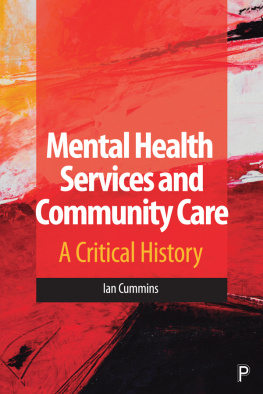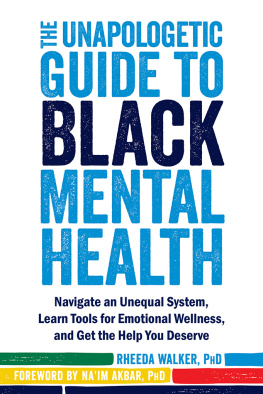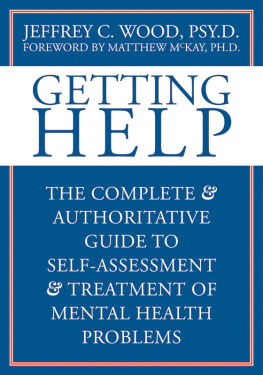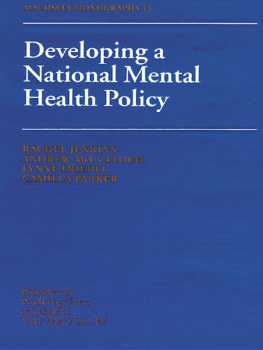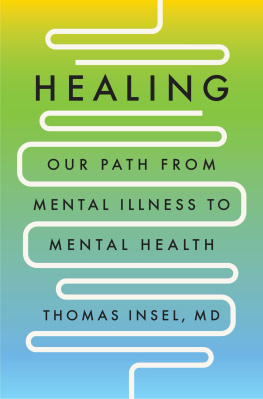Mental Health and the Criminal Justice System
A Social Work Perspective
First published in 2016 by Critical Publishing Ltd
All rights reserved. No part of this publication may be reproduced, stored in a retrieval system, or transmitted in any form or by any means, electronic, mechanical, photocopying, recording or otherwise, without prior permission
in writing from the publisher.
Copyright 2016 Ian Cummins
British Library Cataloguing in Publication Data
A CIP record for this book is available from the British Library
ISBN: 978-1-910391-90-7
This book is also available in the following e-book formats:
MOBI ISBN: 978-1-910391-91-4
EPUB ISBN: 978-1-910391-92-1
Adobe e-book ISBN: 978-1-910391-93-8
The rights of Ian Cummins to be identified as the Author of this work
have been asserted by him in accordance with the Copyright,
Design and Patents Act 1988.
Cover and text design by Greensplash Limited
Project Management by Out of House Publishing
Printed and bound in Great Britain by Bell & Bain, Glasgow
Critical Publishing
152 Chester Road
Northwich
CW8 4AL
www.criticalpublishing.com
Dedication
For my wife Marilyn, and my sons Nelson and Elliot
Help us to help you!
Our aim is to help you to become the best professional you can be. In order to improve your critical thinking skills we are pleased to offer you a free booklet on the subject. Just go to our website www.criticalpublishing.com and click the link on the home page. We have more free resources on our website which you may also find useful.
If youd like to write a review of this book on Amazon, Books Etc, or Wordery, we would be happy to send you the digital version of the book for free.
Email a link to your review to us at admin@criticalpublishing.com, and well reply with a PDF of the book, which you can read on your phone, tablet or Kindle.
You can also connect with us on:
Twitter @CriticalPub#criticalpublishing
Facebook www.facebook.com/Critical-Publishing-456875584333404
Our blog https://thecriticalblog.wordpress.com
Contents
Lists of Tables and Figures
Tables
Figures
)
Meet the Author
Ian Cummins is senior lecturer in social work at the University of Salford. His main research revolves around the experiences of people with mental health problems in the Criminal Justice System with a focus on policing and mental illness. This is linked to an exploration of the development of the penal state and its interaction with community-based mental health services. He is interested in the ways the CJS has become, in many instances, the default provider of mental health care.
Acknowledgements
This work is based on my social work practice experience, academic research and teaching. I would like to thank my fellow social workers, academic colleagues and students for the opportunity to discuss and develop my ideas with them. The enthusiastic support of Donna Peach, Jameel Hadi, Sarah Pollock, Jo Milner and Kate Parkinson enabled me to finish this project. Scott Grant (Glasgow Caledonian University) and Karen Kinghorn (Salford University) very kindly read drafts of the book. Di Page at Critical Publishing has provided excellent support and advice.
Clarence the Angel says no man is a failure who has friends, so thanks to mine: Deryck Browne, Janet Chapman, David Edmondson and Christine Hayes; Marian Foley, Martin and Penny King; Gavin and Trisha Kendall; Jane Lucas, Bernard Melling, Bryn and Viv Morris; Lisa Morriss, Dave, Nick, Steve and Stuart Norwood; and Emma Palmer, Barry Schilling and Jonathan Simon for their friendship, support and coffee. Without them, I would not have completed this work.
Finally, I would like to thank my sisters, Helen, Denise, Kate and Colette and my brother, Michael, for all their love and support. This work is dedicated to them and my late mother Violet, who loved books.
Foreword
Many opinion leaders in both the UK and the US claim to be shocked to discover the ubiquitous presence of people with serious mental (and often physical) illnesses in the jails and prisons of both countries. This shock may be genuine and the moral outrage it often gives rise to useful for those of us seeking deep reforms in our criminal justice systems, but it also belies the chain of public policy decisions taken in both countries over the last half century that has produced this result. The punitive turn in criminal justice policies was part of a larger shift in the governance of poverty (Wacquant, 2009) from the integrationist strategies of social democratic welfarism, to the exclusion and risk-management strategies associated with the neo-liberal consensus of the past quarter century (Garland, 2001). The result in almost every society that has made this turn is a dramatic expansion of the prison population but was also preceded by a parallel abandonment of a social commitment to addressing the mental health needs of the poor. This neo-liberal governance of the poor, long presented as a project of being tough on both criminals and welfare recipients, is today emerging in the new light of a burgeoning crisis of chronic illness, both physical and mental. The valorization of personal responsibility as a foundation for citizenship finds its perfect expression in the structural violence of people shot to death by the police, suicided by jails without diagnosis or treatment, and prosecuted by courts legally blinded to the exigencies of mental illness.
We should be too nostalgic for the mental health policies that went along with the emerging welfarist policies of the post-World War II era. The large and coercive public hospital system built up in the nineteenth century became even more aggressive in its efforts to contain deviance in the post-World War II period and epitomized many of the flaws of social policy under welfare capitalism. Driven by the disciplinary ambitions and productivist fantasies of full employment of industrial societies that had experienced total war, mental health policy aggressively incorporated deviant behaviors and people of all sorts, whether a threat to anyone or not, into coercive systems of normalization. Involuntary commitment standards allowed people to be coercively confined on the basis of complaints by their families and neighbors or local police with little scrutiny as to what danger they posed to themselves or others, and (outside of expensive private hospitals) with little real effort at treatment.
Well before the punitive turn in criminal justice began, this coercive system of public mental hospital came under attack from sociologists, journalists, and mental health treatment survivors. Combined with advances in pharmaceutical treatments, and the shift in the mental health profession toward servicing middle-class patients with behavioral problems rather than profound psychoses, these criticisms soon found expression in new state policies in the US (and somewhat later in the UK) promoting the de-institutionalization of people with mental illness and a shift toward community-based treatment. The latter never developed: the first victim of the new political economic structural arrangements that would mark neo-liberalism.




